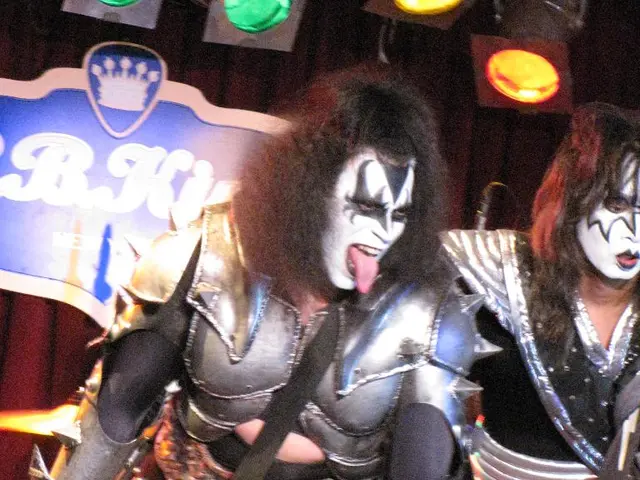Worry About Disney's Decreased Creative Motivation
For years, Disney's reign as the king of entertainment has been a topic frequently discussed, and rightly so. They hold the title of the biggest entertainment conglomerate across the globe, and their deeds are thrown wide open for all to judge. While it's understandable to have complaints about their fixation on sequels and nostalgia, their remakes of classic films, and the monopoly they've created by buying up countless brands and companies, there's a new perspective that has emerged in recent times.
It seems that Disney is now locked into a rhythm of churning out brand-centric movies, with little to no daring artistic risks being taken. Their latest hits include sequels like "Inside Out 2" and "Moana 2," remakes such as the "Lilo & Stitch" remake, and films that capitalize on nostalgia and popular characters from existing franchises. While each of these films has the potential to be exceptional, given the right effort, the majority tend to disappoint, offering nothing new or captivating beyond reminding audiences of the past.
This trend appears particularly prevalent in Pixar's sequels to "Toy Story" and "The Incredibles," Disney Animation's upcoming "Zootopia 2" and planned Frozen films, and Marvel's shift towards the old X-Men and bringing back Robert Downey Jr. as Dr. Doom. It's a sign that Disney's creative direction is skewing this way, and it raises concerns about the artistic potential moving forward.
In the 90s, Disney's CEO, Michael Eisner, declared that Disney's primary focus was making money, with art being a mere byproduct. While this may seem true, the sense of effort put into their endeavors was still palpable. Now, Disney's immense collection of brands and intellectual properties (IPs) have left them with no incentive to take risks or experiment at all with their brand. Back in the 90s, Disney took risks by expanding their theme park brand, developing new talent within their animation division, and investing in Pixar for the creation of the first computer-animated films. Now, they seemingly rest on their laurels, hiring directors who simply follow the producer's orders without a truly independent artistic approach.
The result is a feeling of safety and lack of ambition in many of their films, as they seem more focused on meeting brand expectations rather than creating a film that will stand the test of time. "Wish," Disney's film meant to celebrate their 100-year anniversary, serves as a powerful example. This film was met with hatred and ridicule due to a lack of passion and a focus on adhering to a formula for algorithmically successful films, discarding any interesting ideas in favor of safer elements. Even the animation, while interesting on paper, felt half-baked, lacking the commitment to a new style or the reintroduction of hand-drawn animation. The songs, composed by inexperienced pop songwriters, were heavily mocked.
Sadly, even when Disney allows films to be more artistically interesting and distinctive, they fail to give them the attention and promotion they deserve. Films like "Luca," "Raya and the Last Dragon," and "Turning Red" were dumped onto Disney+ instead of receiving a proper theatrical release, while efforts like "Strange World," "Elemental," and the upcoming "Elio" were given poor marketing and a lack of focus compared to the brand films.
The biggest issue lies in the utilization of these brands, which seems to be heading in a direction that feels cheap and hollow. The Disney remakes are nothing more than carbon copies of the originals with arbitrary changes, mirroring the act of copying homework for a new assignment. These films keep working, with audience members drawn in by nostalgia, no matter how poor the quality. The same can be said of Marvel and Star Wars, which focus heavily on quantity rather than quality.
Star Wars, in particular, has fallen into a cycle of nostalgia and a fixation on side characters. The upcoming film is a continuation of this trend, bringing back characters from "Clone Wars" and "Rebels." Even projects like "Andor" stand out as anomalies given the franchises' current obsession with recognizability and nostalgia. Rian Johnson stated that new risks were necessary to keep the franchise alive, but Disney seems content to head in the opposite direction to detrimental results.
Outside of films, Disney's theme parks have also fallen victim to this trend. Modern hotels have embraced a cold, modernist look that lacks the charm and detail of past resorts. The same can be said for the overall quality of life at the parks, which has declined alongside price increases and the implementation of a paid system for line reservations that has disrupted the traditional waiting experience. Rides are also being built with an IP-focus, with iconic areas like Muppet Vision and the Tom Sawyer Island replaced to make way for new Cars and Monsters Inc. attractions.
In short, Disney's intense focus on brands is pushing them towards a short-term gain, with little support for new original projects and a tendency to hire yes-men directors to focus on nostalgia or quick productions. Disney doesn't seem to be interested in taking many risks on new projects, instead opting to throw them onto streaming platforms or neglect them entirely. What's more concerning is that there's no sign this is changing anytime soon. After "Lightyear," a "Toy Story" spin-off flopped, Pixar CEO Pete Doctor stated that the studio would be pivoting to making films with broader appeal, as opposed to individual stories and experiences. This revelation angered many, as it seemed to imply that Pixar would shift towards making more generic sequels and films that take no risks, a sad development given the trailblazing spirit that originally defined the studio.
Films like "The Lion King," "Toy Story," and even the original "Snow White" were once massive risks that nearly everyone doubted, but they ended up becoming cultural forces because of the artists' confidence and their willingness to deliver on a vision. The current state of the entertainment industry is chaotic due to the power of streaming and the decline of theater attendance. However, Disney seems less focused on finding solutions and more content to keep kicking the can down the road. They seem to lack a coherent plan for when they run out of things to remake, make sequels to, or reboot. Despite Disney's historic highs and valleys, it seems that meaningful artistic revival may be some distance away, given the current emphasis on remaking "Moana" so shortly after the original film's release.
- Reviews have consistently questioned Disney's current approach to entertainment, with concerns about the lack of artistic risks in their movies, such as the sequels "Inside Out 2" and "Moana 2," remakes like the "Lilo & Stitch" remake, and films that capitalize on nostalgia.
- The pop-culture landscape is abuzz with discussions about Disney's creative direction, as their latest offerings in music, movies, and movies-and-tv seem to skew towards brand-centric projects, often neglecting original projects with potential to stand the test of time.
- Pop culture pundits and reviewers are raising eyebrows at Disney's recent fixation on nostalgia, as they continue to remake classic films like "The Lion King" and "Beauty and the Beast," and often fail to produce exceptional works beyond reminding audiences of the past.
- The entertainment industry is closely examining Disney's strategies, particularly their business model that prioritizes brands over artistic risks, as evidenced in their movies, music, and theme parks, and the impact this has on the quality of their offerings in popular culture.








